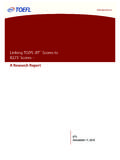Transcription of to test takers - cambridgeenglish.org
1 Information for Candidates Introducing IELTS. to test takers The test that Accessible and convenient IELTS is offered up to four times a month in more than opens doors 140 countries. Tests are held on Saturdays and Thursdays. To find out test dates in your area, please contact your nearest IELTS test centre. A list of all IELTS test locations around the world worldwide is available at The international test IELTS is internationally focused in its content. For example, texts and tasks are sourced from publications from all over This booklet contains the English-speaking world; a range of native-speaker accents (North American, Australian, New Zealand, British etc.) are important information used in the Listening test; and all standard varieties of English are accepted in test takers ' written and spoken responses.
2 To help you prepare The test that's tried and trusted IELTS has been developed by some of the world's leading for your IELTS test. experts in language assessment, and is supported by an extensive programme of research, validation and test development. The level of the test IELTS is designed to assess English language skills across IELTS, the International English a wide range of levels. There is no such thing as a pass or fail in IELTS. Results are reported as band scores on a scale Language Testing System, is from 1 (the lowest) to 9 (the highest). designed to assess the language ability of people who want to The IELTS band score scale study or work where English is 9 Expert user the language of communication.
3 8 Very good user IELTS is recognised and accepted by 7 Good user over 9,000 organisations worldwide, 6 Competent user including universities, employers, 5 Modest user professional bodies, immigration 4 Limited user authorities and other government 3 Extremely limited user agencies. For a list of organisations 2 Intermittent user that accept IELTS scores, 1 Non user visit 0 Did not attempt the test IELTS for UK Visas and Immigration Find out how you can use an IELTS result for this purpose at For more information on going to or staying in the UK, visit Preparing for your test Test format Make sure you are ready to demonstrate your English There are two modules to choose from.
4 1. Familiarise yourself with the format of the test by reading this Academic and General Training. booklet. If you would like more information about the format of the test and the question types used, you can find the test specifications at IELTS Academic IELTS Academic is for test takers wishing to study at 2. Practice using sample questions from undergraduate or postgraduate levels, and for those 3. Consider doing a practice test. Two volumes of Official IELTS seeking professional registration. Practice Materials are available for purchase from test centres or at These materials include a full IELTS General Training practice test with answers, and sample writing and Speaking IELTS General Training is for test takers wishing to migrate to an performances with examiner comments.
5 English-speaking country (Australia, Canada, New Zealand, UK), and for those wishing to train or study at below degree level. 4. Consider enrolling in a preparation course to improve your performance in the test. IELTS test centres and language schools around the world offer IELTS preparation courses. Each organisation sets its own entry requirements. In some cases both Academic or General Training may be accepted. If you are More information is available from: in doubt as to which to take, you should contact the organisation you are applying to in order to check their requirements. You are tested on all four language skills listening, reading, writing and speaking, unless you have an exemption due to a disability (see section on special requirements).
6 Everyone takes the same Listening and Speaking tests. There are Know the IELTS rules and regulations different Reading and writing tests for IELTS Academic and It's important to familiarise yourself with the IELTS rules and General Training. regulations. These are laid out in the Notice to Candidates and Declaration which are included in the application form. The Listening, Reading and writing tests must be completed When you sign the application form declaration, or agree to on the same day. The order in which these tests are taken the terms online, you are confirming that you have read and may vary. There are no breaks between these three tests. understood the IELTS rules and regulations and agree to The Speaking test may be taken up to seven days before abide by them.
7 Or after the other three tests. Register as soon as possible When you feel you are ready to take the test, you need to Listening register for a test date with an IELTS centre. Contact the centre as soon as possible, as the number of test takers who can take the test on a particular date may be limited. You will need to pay the test fee when you register. Tell your centre if you have special requirements Academic Reading General Training Reading In order to ensure that the language ability of all test takers is assessed fairly and objectively, IELTS provides a comprehensive service for test takers who have special requirements, including specific learning difficulties, hearing difficulties and visual difficulties.
8 Academic writing General Training writing If you require a modified version of the test, for example a Large Print or Braille version, you must give the test centre three months' notice. This notice period is necessary for the modified test version to be prepared. If your circumstances require special administrative arrangements to be made, for example if you need Speaking extra time or you need to use access technology such as a screen reader, you must give the test centre six weeks' notice. Please contact your test centre to discuss your requirements. Any special arrangements agreed are in accordance with the Joint Council for Qualifications (JCQ). 3. The four components of the IELTS test Listening Timing Section 3 is a conversation between up to four people Approximately 30 minutes (plus 10 minutes' transfer time).
9 Set in an educational or training context ( a university tutor and a student discussing an assignment, or a group Questions of students planning a research project). There are 40 questions. A variety of question types are used, chosen from the following: multiple choice, matching, plan/ Section 4 is a monologue on an academic subject map/diagram labelling, form completion, note completion, ( a university lecture). table completion, flow-chart completion, summary completion, sentence completion, short-answer questions. Each section is heard once only. Test Parts A variety of voices and native-speaker accents are used. There are 4 sections: Skills assessed . Section 1 is a conversation between two people set A wide range of listening skills are assessed, including: in an everyday social context ( a conversation in u nderstanding of main ideas an accommodation agency).
10 U nderstanding of specific factual information r ecognising opinions, attitudes and purpose of a speaker Section 2 is a monologue set in an everyday social context f ollowing the development of an argument. ( a speech about local facilities or a talk about the arrangements for meals during a conference). Marking Each correct answer receives 1 mark. Scores out of 40 are converted to the IELTS 9-band scale. Scores are reported in whole and half bands. Reading Timing General Training Reading 60 minutes (no extra transfer time). Section 1 contains two or three short factual texts, one of which may be composite (consisting of 6-8 short texts related by topic, Questions hotel advertisements).
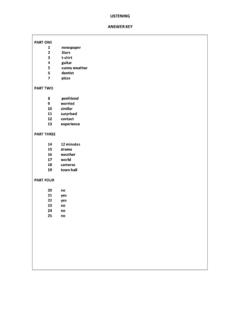
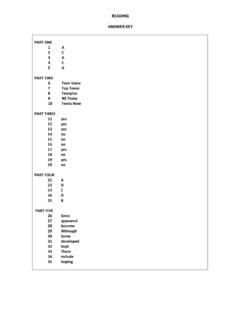
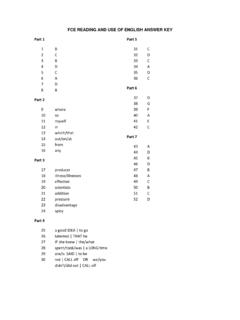
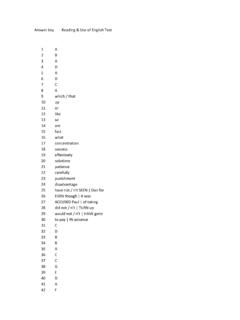
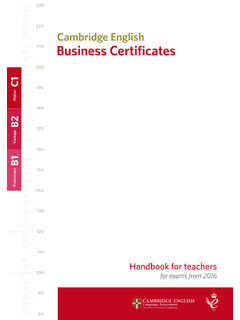
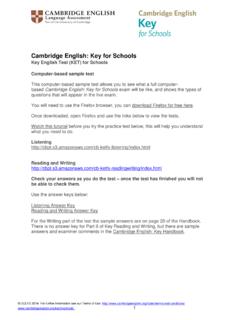
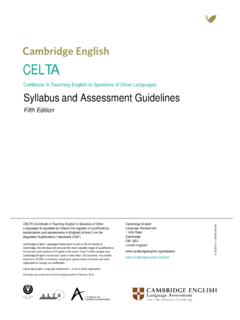
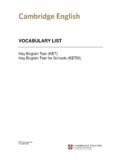
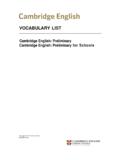
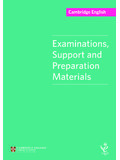
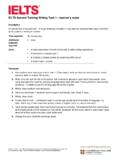
![4173 7Y07 IELTShbk body [prf5] - IELTS Exam …](/cache/preview/b/8/c/8/a/2/e/3/thumb-b8c8a2e3db809084f54cadd9ec36d575.jpg)
